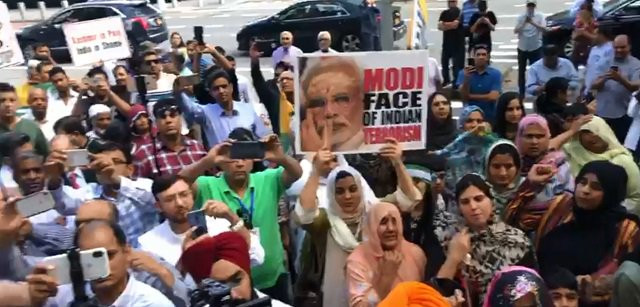It is the people
The argument about Kashmir is predicated on universal human rights which Pakistan is using on every forum

UN should play its role as the valley of occupied Kashmir has been turned into a jail says PM AJK. PHOTO:EXPRESS.
When the premier medical journal Lancet, in its editorial last week, called on the Indian government to do the right thing, and ease the suffering of the people of Kashmir who have been under a lockdown since the Modi government revoked the special status of the disputed state on August 5, many in the Indian medical circle told Lancet to back off. Not because Lancet’s arguments about mental health of the Kashmiris were rooted in a flawed study, or the report by the United Nations High Commissioner for Refugees was quoted incorrectly, or because this was India’s internal matter.
That argument – despite being one of the oldest in the book – is inherently flawed. Human rights violations – such as imposing a curfew; imprisoning hundreds of people without any cause; choking the communication channels like telephone, Internet and cable television; denying access to food, water and even medicines; and severely restricting the rights of the people – cannot be brushed under the carpet as an internal matter.

Lancet has, in the past, called upon on the United States government to change gun laws; argued for the rights of minorities across the world (including Pakistan); and taken a strong stance on discrimination. While the Indian Medical Association, in its official communique, connected Lancet to British imperialism, it did not rebut any of the arguments. However, many in India did ask their fellow citizens to do some introspection. These colleagues are brave and bold and have taken a personal and professional risk — something for which they need to be acknowledged and commended. There is, indeed something for many of us to learn from those who speak truth to power.
The entire argument about Kashmir is predicated on universal human rights, and Pakistan and many Pakistanis are using this argument at every forum. The argument is solid and attractive but it also comes with responsibility. The rights of people are sacred everywhere, not just in Kashmir.
Published in The Express Tribune, August 27th, 2019.
Like Opinion & Editorial on Facebook, follow @ETOpEd on Twitter to receive all updates on all our daily pieces.














COMMENTS
Comments are moderated and generally will be posted if they are on-topic and not abusive.
For more information, please see our Comments FAQ